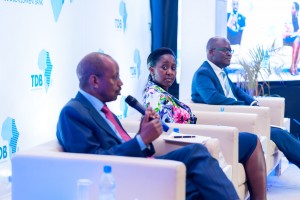PTA Bank re-brands to become TDB

Muhakanizi, the current TDB Board Chairman, explains a point during a news conference with Kamari and Bbosa looking on early this week.
November 14—The Eastern and Southern Africa Trade and Development Bank, commonly known as the PTA Bank, has re-branded to become the Trade Development Bank ( TDB).
“Our new name will help us to achieve the bank’s objectives among which is spearheading trade among our member states. Our re-branding represents rejuvenation and re-commitment to innovate and play a more active role in promoting trade,” Mary Kamari, the Director for Corporate Affairs said during a news conference in Kampala early this week.
TDB is the financial arm of the 20 member Common Market of Eastern and Southern Africa (COMESA) with its headquarters in Bujumbura, Burundi and regional offices in Harare, Nairobi and Ebene in Mauritius. Assets are now close to $3 billion.
She said, the re-branding follows several years of improved asset quality, healthy profitability and innovation on the back of a series of institutional reforms aimed at strengthening and modernizing the bank.
Admassu Tadesse, the bank’s Chief Executive Officer/President said they have dramatically increased their capacity to meet the rising demand for the bank’s products and services from their customers both from governments and the private sector.
Keith Muhakanizi , the Permanent Secretary in the Ministry of Finance Planning and Economic Development said the bank has been very supportive to Uganda.
“The bank has been very supportive to the government of Uganda. Recently we secured $200 million in loans which we have used to improve infrastructure in Kampala city among other ongoing projects across the country,” he said. Muhakanizi is the currently chairs the TDB board. The bank was set up in 1985.
TDB membership is also open to non-COMESA states, non-regional countries as well as institutional shareholders. In 2014, China became the first non-regional shareholder in the bank. The bank offers a broad range of products and services, across both the private and public sectors, including debt, equity and quasi-equity as well as guarantees. TDB investments cut across agriculture, trade, industry, infrastructure, energy and tourism, among others and are made on a commercial basis and sustainability principles.
Explaining on what has helped the bank to sustain itself, Kamari attributed this to strong relationships between the bank and its funders. The African Development Bank and the World Bank through its private sector arm the International Finance Corporation are major partners to TDB.
Kamari said, “As TDB, we have built strong relationships with our funders, especially those willing to finance long-term loans. This has helped the bank to offer quality long term financing loans to our clients. We are also seeing our shareholders base increasing by more than 50% in recent years.”
The Director of Portfolio Management, Wycliffe Bbosa, said TDB will continue supporting both governments and the private sector among its member’s countries. “At TDB we are committed to finance government projects especially infrastructure development such as power, roads which are crucial in supporting economic growth among our member’s states,” he said.
In Uganda’s case, the bank extended loans to two firms Kampala Cement, and Abacus Pharmaceuticals. The bank offered loans totaling to $9.1million to Abacus to construct state-of-the-art plant in Mukono, along the Jinja Highway while Kampala Cement used the TDB loan to increase output to a million to tonnes annually.

 African Heads of state head to South Korea next week for Summit talks
African Heads of state head to South Korea next week for Summit talks
 Trading leads as main source of income for Ugandans
Trading leads as main source of income for Ugandans
 New leadership for bankers’ umbrella as total assets top $12 billion
New leadership for bankers’ umbrella as total assets top $12 billion
 Brussels Airlines to announce Nairobi service
Brussels Airlines to announce Nairobi service
 SITA promises enhanced travel experience after Materna acquisition
SITA promises enhanced travel experience after Materna acquisition
 Saudia’s 105 aircraft order stretches A320neo lead over rival Max
Saudia’s 105 aircraft order stretches A320neo lead over rival Max
